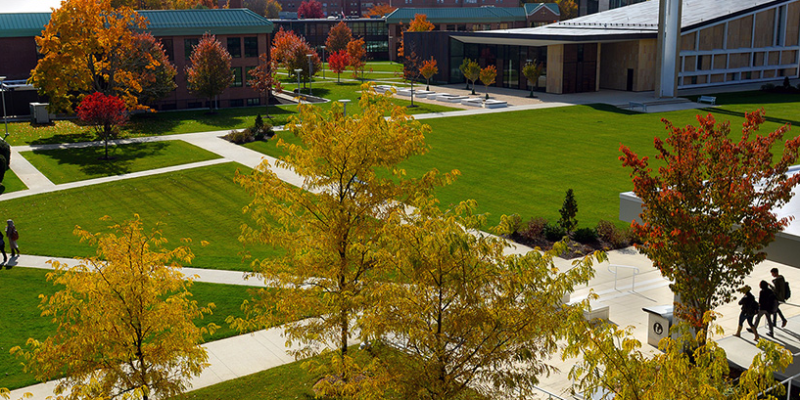Campus landscapes are advancing higher education’s sustainability mission. As universities adopt and improve on energy efficiency, green infrastructure and water conservation initiatives, landscape performance is becoming essential to generate best-in-class environmental metrics.
ELM is working with colleges and universities across Connecticut and New York metro to address both landscape construction and maintenance objectives, as well as innovative water and resource conservation, watershed and stormwater management, responsible approaches to pest and disease management, meeting zero waste to landfill, and reducing carbon footprints in the following ways:
- Modifying our production processes to meet resource reduction targets.
- Using less toxic or non-toxic substances.
- Implementing conservation techniques through water management and smart water technology.
- Improving water governance.
- Providing solutions in stormwater management, flood control and drainage systems, bioswales and rain gardens to enhance water quality, filter runoff, and recharge local aquifers.
- Reducing heat island effect by replacing surface space, and implementing and maintaining green roofs and vertical gardens and outdoor spaces to address heat absorption and filter water.
- Using strategic planting and plant health care and maintenance strategies to improve air quality, and provide attractive, cohesive park-like settings that serve as both healthy respite and multi-purpose outdoor learning space.
- Protecting wildlife corridors and habitats, watersheds, and riparian zones by reducing pollutants.
- Reusing and recycling materials rather than putting them into the waste/landfill stream.
- Using renewable energy, flexible fuel or low emissions vehicles, and autonomous equipment.
- Upgrading equipment and approaches to better deliver on goals for safety, efficiency, service and innovation.
- Training our team for sustainability engagement and greener mindsets.
- Using lean approaches to minimize waste without sacrificing productivity.
- Embracing responsible consumption by minimizing fuel consumption, mapping routes, production and logistics for optimum efficiency.
- Supporting LEED and green building goals to reduce environmental impacts and overall exposure to water, waste, and weather events.
- Including SMART goals in our planning to take landscape planning and higher education green objectives to the next level.
- Investing in continuous green improvements.
- Receiving the ChangeMakers Award from Fairfield County for sustainable water conservation program.
About Us
ELM is recognized as a leader in campus landscape sustainability planning and implementation and offers five ways in which our specialists can customize a working relationship with campus facility managers to improve sustainability:
- Full service outsource partner – landscape construction and renovation; green infrastructure; site improvements; landscape maintenance; plant health care; water management; and snow and ice/winter management.
- Specialty landscape contractor for grounds maintenance and management, snow and ice, irrigation and water management, performance turf and athletic fields.
- Specialty landscape contractor for broad site improvements and green infrastructure, stormwater and drainage systems, and site amenities.
- Full-service landscape maintenance.
- Team partner with general contractors, design-build teams, or onsite horticultural and/or grounds professionals.
Whether refreshing iconic campus footprints, innovating for a next generation of students and faculty, or to lead capital improvement for conservation and development, ELM is shaping campus green spaces to connect people to nature, to each other and to the future they serve.

